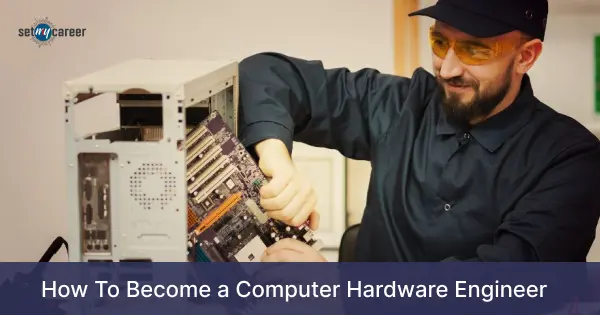
Published By Team Setmycareer on Sep 25, 2023
Discover How To Become a Computer Hardware Engineer

Computer hardware engineers are in charge of the design, construction, and testing of software applications, platforms, processors, and electronic components. They work with keyboards, networks, and scanners, among other things.
| Highlights | Description |
|---|---|
| Innovation and Design | Opportunity to innovate and design cutting-edge hardware components. |
| Problem Solving | Tackle complex technical challenges and optimize hardware performance. |
| Diverse Applications | Work across various industries, from consumer electronics to aerospace and healthcare. |
| High Demand | Strong demand for skilled hardware engineers in tech companies and startups. |
| Competitive Salary | Enjoy competitive salaries, often above the national average. |
| Continuous Learning | Stay updated on the latest technologies and trends in a constantly evolving field. |
| Collaboration | Collaborate with multidisciplinary teams to create integrated solutions. |
| Career Growth | Advance to roles like lead engineer, project manager, or CTO with experience and specialization. |
| Influence on Technology | Contribute to the development of devices and systems that impact daily life. |
| Global Opportunities | Work on international tech projects and initiatives. |
Follow these steps to embark on a rewarding career as a Computer Hardware Engineer!
Hardware engineer is another term for this job. Computer hardware engineers plan, develop, and manage the production and implementation of computer systems and peripherals. They frequently devote a significant amount of time to resolving issues, assisting with installation, and doing computer market research. The classifications, pay statistics, and professional predictions for computer hardware engineering and associated occupations are summarized on the following page.
Engineers who work in the field of computer equipment design the hardware elements that enable machines to function. They create novel hardware systems, test them, evaluate the findings, and oversee project manufacture.

Are you feeling uncertain about your career path? Not sure which direction to take? Take the first step towards a fulfilling future
Once you procure the required qualifications for becoming a Human Factors Engineer, a myriad of options are open to you. There are multiple projects you can undertake throughout this line of work, and there are many other fields you can branch out to as well.
Computer Hardware Engineers can opt for various fields of work in the companies listed below:
Ready to take the next step towards your dream career? Let's get started! Take our Career Tests and schedule a personalized career Counselling career Counselling Session With Our Expert
We understand that making important career choices can be overwhelming and uncertain. The decisions you make today will shape your professional journey and have a lasting impact on your life. That's why we highly encourage individuals like you to talk to our experts before making any significant career decisions. Our team of experienced career counselors is here to provide you with the guidance and support you need to make informed choices that align with your aspirations and goals.
No. 14/595, 1st Floor, Nanjappa Reddy Layout, Koramangala 8th Block, Bangalore 560095